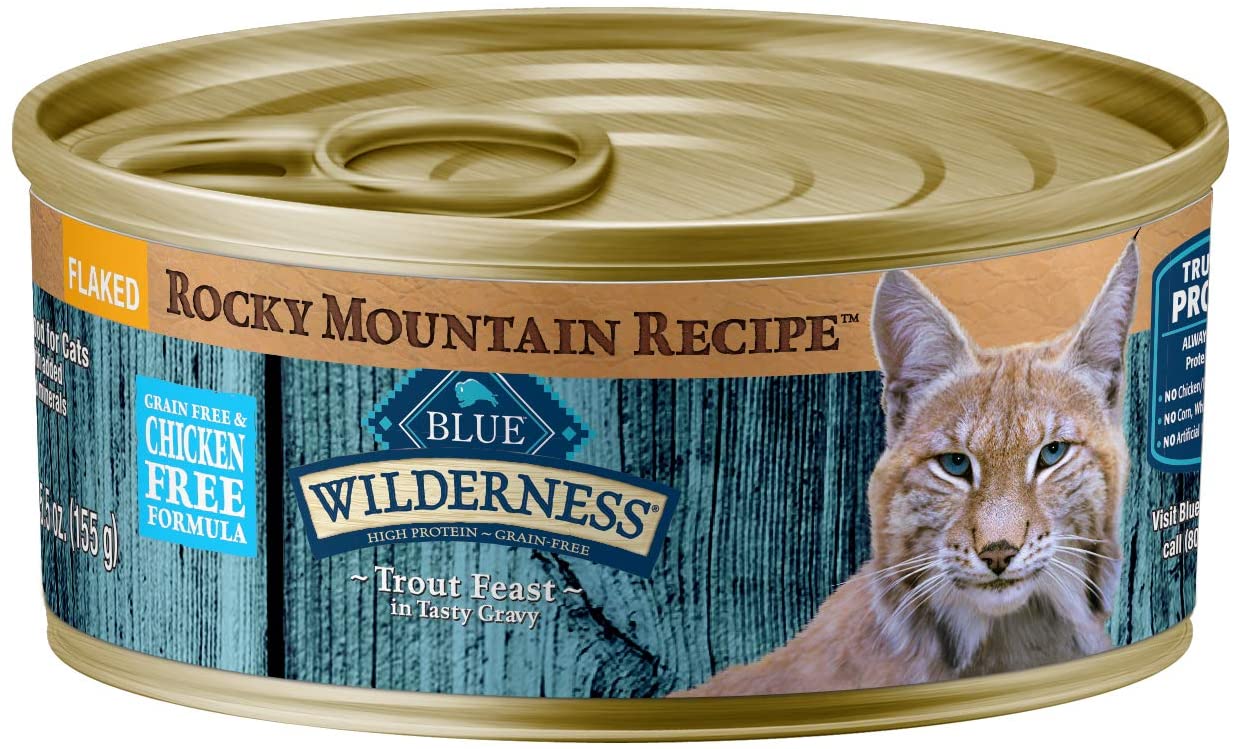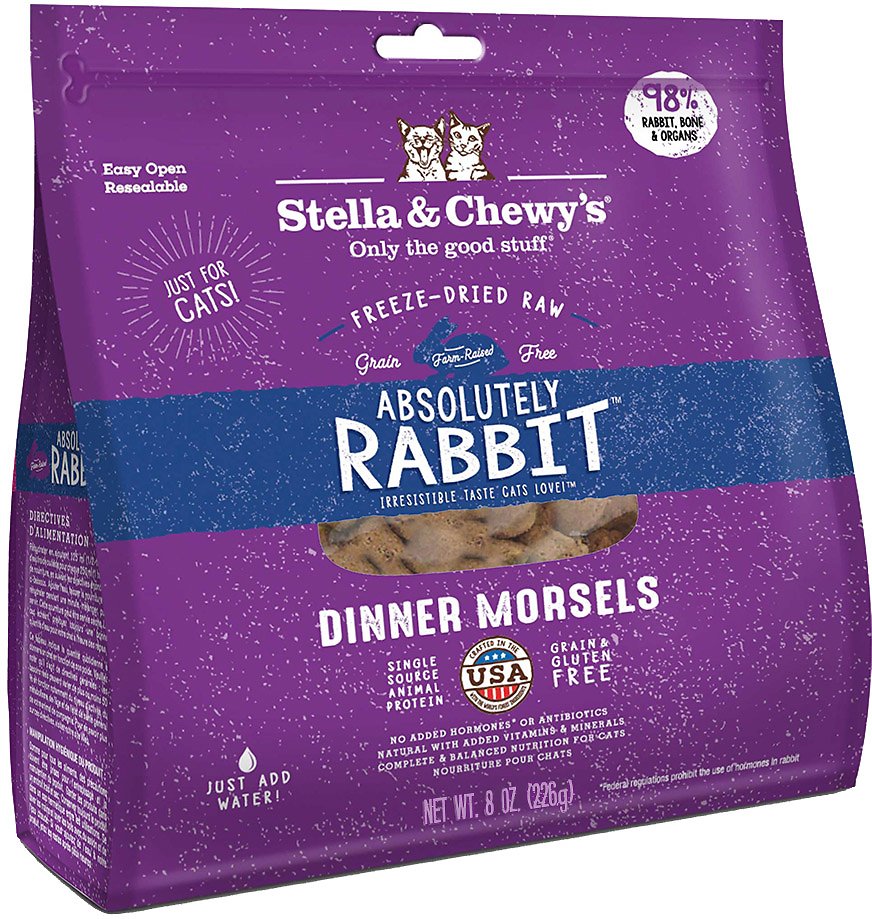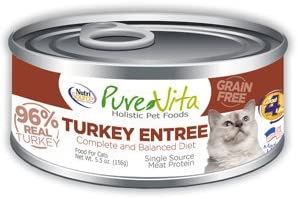Best Foods for Cats With IBD
Feline inflammatory bowel disease (IBD) is more common than most cat parents might imagine. The condition can cause irritation and inflammation of the intestinal tract. It mostly affects middle-aged cats but cats of any age can get affected. When left untreated, inflammatory cells can penetrate into the walls of the intestinal tract and affect the function of the intestines. Your vet will suggest the best treatment option, but you usually need to start by switching to the best food for cats with IBD.
Here are some suggestions to help you select the best food to deal with inflammatory bowel disease in cats.
The Best Food for Cats with IBD: Our Top Picks
1. Blue Mountain Flavorful Fish Feast Cat Food
If you're looking for the best food for IBD, which is also nutritious, you should seriously think of going for this protein rich option. The main ingredients are salmon, tilapia, yucca, beef fat, and carrot. As tilapia and salmon are the major sources of protein, your cat is going to find it extremely nutritious.
It works great as a food for IBD because it relies on the premises that cats should get species-appropriate nutrition. This homemade-style cat food scores big in this regards, as not only does it contain protein, it also has other vitamins, minerals, and fatty acids as well. It's for this reason that it may also work for colitis in cats, though it's a good idea to talk to your vet first.
Some people might not be very happy with the fact that it's not free from food-based ingredients, but it still contains enough salmon and flaked tilapia to provide quality protein to your cat. Another great thing is that if you buy this cat food for IBD, the company gives you access to their nutrition experts to find a better plan for your cat.
PROS
CONS
2. Stella & Chewy's Freeze-Dried Cat Food
For IBD cats, not just any food will work, but you can't go wrong with this freeze-dried cat food for IBD. It contains high quality ingredients and can easily be stored at room temperature for long. The top five ingredients are rabbit ground bone, pumpkin seed, olive oil, sodium phosphate monobasic, and potassium chloride. It's the raw food diet, so your cat's IBD symptoms are likely to subside after you switch to this food for IBD.
These freeze-dried morsels provide high quality, readily digestible novel protein, which comes from rabbit, which is why there are fewer chances of aggravating the symptoms of inflammatory bowel disease. Cats won't develop digestive problems either because the formula doesn't contain any potatoes, grains, or other carbs.
Moreover, the novel protein food is fortified with healthy bacteria, which is why it may improve digestion and support the immune system of your cat. The only issue you might encounter is that it takes some time to rehydrate, so it may be a bit inconvenient to use.
PROS
CONS
3. Pure Vita 96% Grain Free Turkey & Turkey Liver Entree
For canned cat food, you can always lay your trust in this brand. It works because its grain free and contains high quality ingredients, such as turkey, turkey liver, turkey broth, and calcium carbonate. It's free from any artificial flavoring, which is another reason why it becomes a good choice for people looking for food for IBD.
As it relies heavily on animal-based ingredients, your cat is going to get the finest quality protein in each serving. It's not heavy on carbs, which is also a good thing about this canned food. You can also try it if you're mainly looking for a limited ingredient cat food because it gets its protein from a single source. The only issue is that it doesn't contain any fish oil or something to provide your cat with much needed fatty acids.
PROS
CONS
FAQ - A Buyer's Guide
How Do You Treat IBD in Cats?
Inflammatory bowel disease can be an extremely annoying condition to deal with, and there's no clear info about what causes it in the first place. Most experts are of the view that it could be the unique combination of your cat's immune system, their dietary proteins, bacterial living in their intestines, and various other genetic or environmental factors. Dietary intolerance, food allergies, bacterial growth, chronic infections, and autoimmune disease can all play a part here and cause Inflammatory bowel disease in cats.
In order to find the treatment option, it's important that your vet tries to identity any underlying health conditions. There are various potential differential diagnoses for IBD in cats, but it's equally important to take into account other potential causes, such as bacterial infection, intestinal parasites, toxin ingestion, medication reaction, exocrine pancreatic insufficiency, gastrointestinal neoplasia, and systemic illness, such as hyperthyroidism, diabetes, or viral illness.
Your vet may also decide to use different diagnostic tests to rule out chances of other conditions, and it may include fecal parasite exam, feline leukemia virus test, thyroid levels check, and feline immunodeficiency virus test. The intestinal biopsy usually helps confirm Inflammatory bowel disease, as it finds the presence of inflammatory cells within the walls of GI tract.
Once confirmed, you can try a number of ways to treat IBD in cat:
Switch to Better Cat Foods
Sometimes, the cat food is the underlying cause of digestive issues in cats. A food allergy is usually not the only underlying cause of IBD, but dietary proteins can certainly aggravate inflammation within the intestines. Therefore, it's a good idea to consider what you're feeding your cat.
With so many good brands, finding the best food for cats with IBD is relatively easier these days. Basically, your goal should be to switch to hypoallergenic diets, which means your cats won't get table foods, treats, and many other food items. You can try it on a trial and error basis to see how it helps the cat.
In most cases, a hypoallergenic diet does the trick, but if it doesn't, you may want to switch to a high-fiber, low fat, highly digestible GI diet. Sometimes, you have to add a probiotic supplement to this diet to help control clinical signs of IBD.
Try Antibiotics
As mentioned already, bacterial infections can also cause all sorts of problems in cats, including IBD, so it makes sense to try antibiotic therapy along with making dietary changes. In most cases, your vet will start with tylosin or metronidazole because these antibiotics help the digestive function in many ways. Not only do they help decrease bacterial populations, but they also lower GI inflammation and decrease protozoal populations.
Make Use of Supplements
Folate and cobalamin supplementation goes a long way in managing signs and symptoms of IBD in cats. Even you buy the best food for cats with IBD, you may still benefit from using these supplements. With IBD, your cat just can't absorb enough vitamins and other nutrients through their intestines, and that's when supplementation helps cover any deficiency. To restore your cat's intestinal health, your vet may decide to use Cobalamin as an injection, whereas they may administer a dose of 1mg of folate by mouth once a day.
Make Use of Corticosteroids
Depending on how your cat's feeling, your vet won't just ask you to switch to the best food for cats with IBD but also recommend using corticosteroids. They're going to do it if they notice severe signs and symptoms, such as extreme weight loss. Corticosteroids usually come into the picture after dietary therapy and metronidazole have failed to produce desired results. Mostly, vets rely on prednisone or prednisolone, and they'll determine a dose considering the severity of the signs and symptoms, as well as the body weight of your cat.
Sometimes, it's important to avoid prednisolone; thankfully, there are alternatives available, such as Budesonide. This corticosteroid may not have serious systemic effects, as it's removed by the liver. Your cat may be able to tolerate it better. But, if your cat is responding poorly to Budesonide and prednisolone, your vet may try some other options, such as betamethasone and dexamethasone.
Make Use of Immunosuppresants
When clinical signs of IBD persist even after using the best food for cats and trying corticosteroids, it may be the time to switch to immunosuppressants. Some common options include chlorambucil, azathioprine, lomustine, and cyclosporine. While these medications may help, they can cause severe side effects and even lead to blood cell abnormalities. Therefore, your vet will advise you to bring your cat for frequent blood testing.
How Do You Treat Inflammatory Bowel Disease in Cats Naturally?
The best way to treat IBD in cats naturally is to switch to good cat food designed specifically for cats with digestive issues. These cat foods won't contain gluten and other allergens, and they may also be fortified with other vitamins and minerals. Here are some options to help you treat IBD in cats naturally:
You can treat IBD in cats by administering B12 injections. They're like to work better because they completely bypass the stomach and small intestines. But, you may not be able to try this option for all your cats because some may resist and others won't even experience enough benefits. If it's difficult to give B12 in an injection form, you may consider switching to a tablet form. Vegetarian versions are available these days and they are complete safe, as they're free of artificial sweeteners, sugar, and added flavoring. Remember, you shouldn't use any product that contains sweeteners such as sorbitol, dextrose, fructose, or sucrose, as they can aggravate feline IBD.
Giving probiotics to your cat is yet another way to treat feline IBD naturally. Probiotics not only help by increasing the number of healthy bacteria in the gut, but they also work by making foods more enticing. Keep in mind that you shouldn't try probiotics made for humans because probiotics for cats use different bacterial strains to match flora in their intestines.
You may also consider giving your cat marshmallow root or elm bark. These natural remedies may prove effective against nausea and digestive issues your cat might be dealing with because of IBD. If you're giving your cat other medications too, ensure that you give marshmallow root at least half an hour after other medications to prevent any absorption issues.
Increasing levels of a potent antioxidant called glutathione may also help with feline IBD, and it can be achieved by giving Denamarin and Dnosyl to your cat, as they contain S-Adenosylmethionine (SAMe). The good thing about SAMe is that it plays a big role in live cell regeneration and repair. Be sure to give these pills when your cat hasn't eaten anything to get the best results.
Strengthening immune system of your cat is important for IBD management. L-lysine is a good choice because of its benefits in treating inflammatory conditions. It helps strengthen the immune system to ward off attacks from allergies, colds, asthma, etc. For cats with IBD, L-lysine will help boost their already compromised immune system, which is likely to improve their chances of fighting off the disease.
Is IBD in Cats Painful?
Yes, it can be painful for many cats if left untreated. Inflammatory bowel disease can cause chronic diarrhea and vomiting in cats, which can cause blood and mucous to appear in the stool. As it's an inflammatory disease, it can cause serious discomfort along with pain.
The pain factor usually depends on the severity of the symptoms your cat is experiencing. Sometimes, it just involves the small intestine and the stomach, but it can also involve the entire GI tract, including the mouth. Your cat may also develop excessive amounts of gas, which is going to be quite painful for them. Cats may also develop cramping and smooth muscle spasms, which can be so painful that your cat sits hunched up to relieve it.
It's important to take immediate steps and work with your vet to identify the underlying cause and select the best treatment strategy to manage feline IBD.
How Do You Stop Diarrhea in Cats with IBD?
IBD can cause a number of symptoms in many cats, but diarrhea is usually the most common. Your cat can develop diarrhea for so many other reasons as well. Before trying anything, it's important to assess the severity of the condition, as it's okay to try home remedies if it's mild diarrhea without any vomiting. But, be sure to call your vet if your very young cat develops diarrhea. The same is true for older cats or cats that already have underlying health conditions.
You may also avoid trying home remedies if your cat is vomiting as well and feels depressed, lethargic and in pain. It warrants a visit to the vet if your cat's diarrhea is watery, profuse, and very frequency. Be alarmed if you notice diarrhea containing blood or is very dark. Only a vet can determine the underlying cause and help resolve those complicated symptoms.
If it's nothing serious, you may consider taking the following steps to manage things at home.
- Find better cat food to prevent food allergies and other similar issues. Sometimes, simply switching to a limited ingredient cat food resolves the issue. Understand that even if your cat has diarrhea, you should not keep them from eating their food, as it increases the risk of developing potentially fatal health conditions. But, make sure to simplify the diet by opting for a high quality limited ingredient cat food with no known allergens in it.
- Often time, cats experience diarrhea after you change their diet. If that seems to be the case, simply go back to their old diet plan and see if this resolves the issue. Remember, even if you're going for the same brand but different food, it can still cause problem because of the ingredients it contains. Going for a hypoallergenic diet is usually the answer to the problem.
- Consider lowering the amount of fiber in your cat's diet if they develop diarrhea frequently. A low-fiber (highly digestible) diet usually works for sensitive stomachs. But, remember, some types of diarrhea may respond better to fiber supplementation. So, work with your vet and be prepared to experiment a little to find the best solution.
- Ensure that your cats get plenty of water and electrolytes when dealing with diarrhea, as this prevents dehydration. Don't leave those water bowls empty at any time.
Other than these remedies, you can also try using probiotics and resort to anti-diarrheal medications to prevent diarrhea in your cat.
The Best Food for Cats with IBD
What causes feline IBD is not clear, but it doesn't mean you should do nothing to help your cat manage those symptoms. Treatment options are available but you'll always have to start by looking for the best food for cats with IBD. If confused, try Stella & Chewy's Freeze-Dried Cat Food, as it's affordable high protein and low-carbs food option for your cat with inflammatory bowel disease.
About the Author Steven
Related Posts
Is It More Cost Effective To Build Your Own Aquarium?
DOT Announces Upcoming Changes for ESAs and Plane Travel
Best Cleaning Tips for Your Aquarium
Best Waterless Shampoos for Your Dog
Best Muzzles for Your Pit Bulls
Best Indestructable Dog Kennels in the Market Right Now




